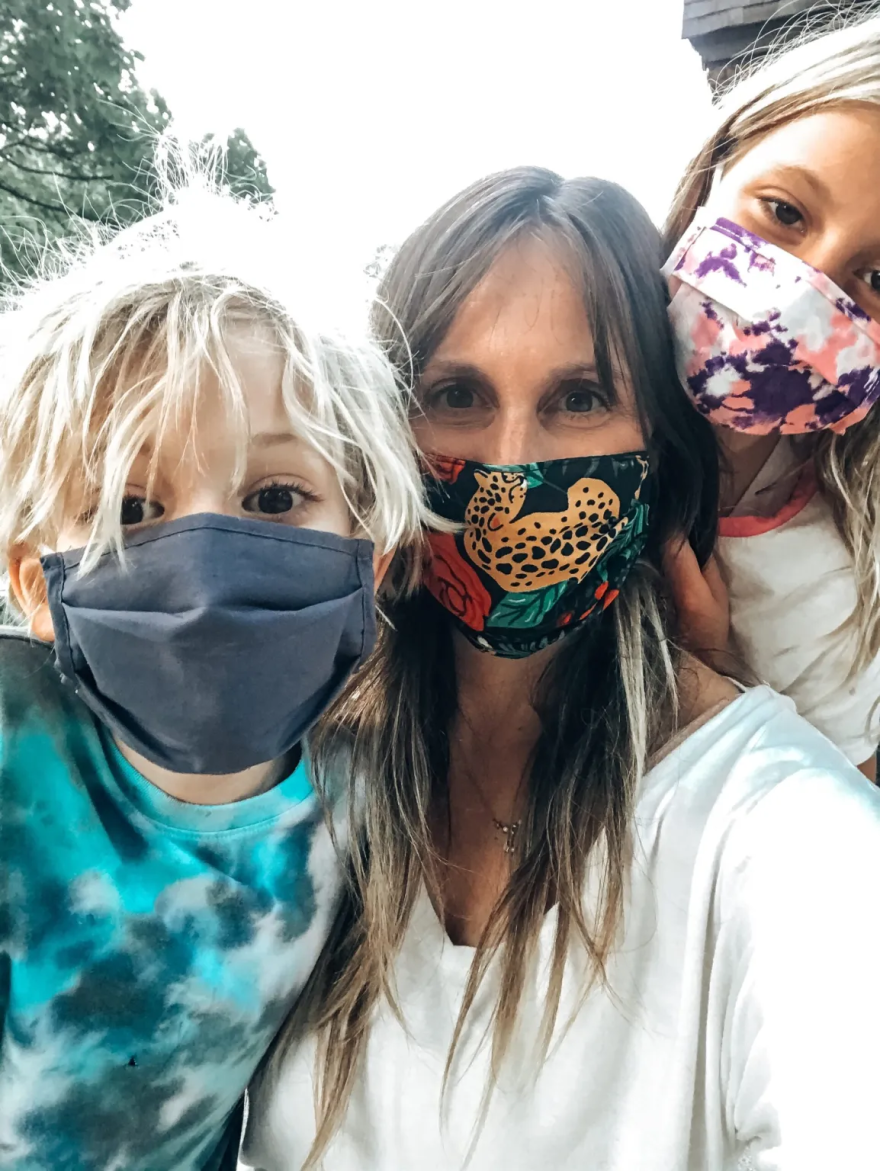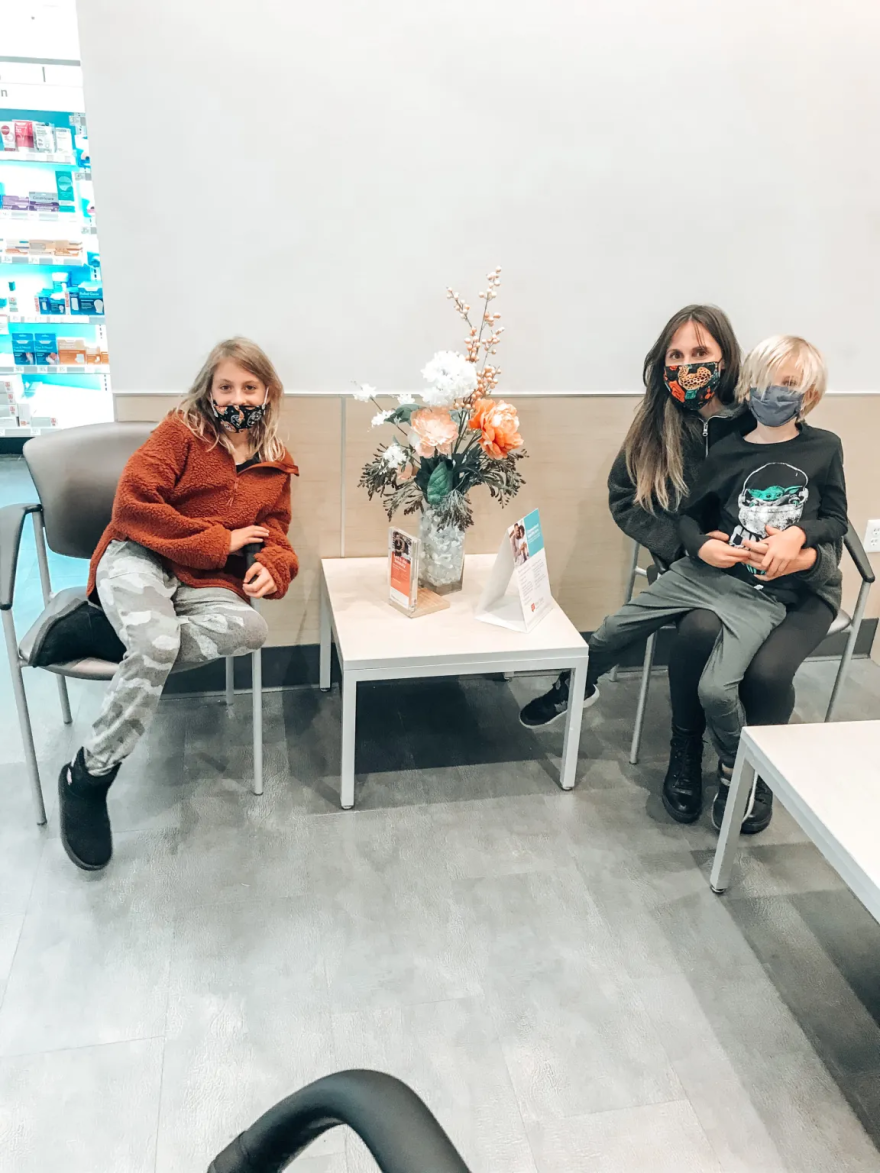Just before the 2021 holiday season, Lora Kawar and Amal Hadid had a somewhat unusual message for their 70,000-plus Instagram followers. For the most part, the two Detroit-based fashion bloggers share classic influencer content on their joint account, @lamstyle_: the two posing in glamorous evening wear, or throwing birthday parties for Hadid’s toddlers that look nicer than the average wedding.
But this time, Kawar and Hadid were dressed for their day jobs as physicians assistants, wearing scrubs and practical shoes at the hospital where they work. And rather than upbeat, inspirational messaging, this time the caption was about COVID hospitalizations. They were on the rise, especially in Michigan.
“This means it’s more important than ever to do your part and get vaccinated. It can never be said enough how important this is to protect both yourself and the people around you! Not only are we both fully vaccinated but we also got the booster recently. This is a testament to our faith in the vaccine, it’s safety [sic] and important role in achieving community immunity. #spreadhopenotcovid #midoseofhope #ad @michiganhhs”
For nearly a year now, state health officials have been trying to convince parents to get their kids vaccinated for COVID-19. And that includes turning to the people who already have a direct line to tens of thousands of Michigan-based moms: influencers.
“Since the COVID vaccine became available to ages 12 and up in May, we have spent a total of $217,000 in federal FEMA dollars on the influencer campaign,” said Michigan Department of Health and Human Services spokesperson Lynn Sutfin in an email last week.
”The bulk of our targeting since has been toward parents specifically (moms mostly, as research shows they are most likely to make the health decisions for their families)," Sutfin said. Other top targets are teens and people in their early 20s, she said.
MDHHS has also spent $750,000 in Facebook advertising credits promoting vaccinations and general safety measures, like masking and social distancing. Sutfin pointed to external marketing research suggesting people may trust promotions from influencers more than traditional ads. Influencers themselves say they’re able to provide sponsors with a more relatable, word-of-mouth connection to consumers, whether they’re selling toilet paper, laundry detergent or vaccinations during a global pandemic.
“I just come from a very authentic place, and I think that's where influencing hits home runs,” said Kari Skubik, a Detroit area-based blogger with 25,000 followers at @dontdresslikeamom. “If you have an authentic voice, people tend to relate to you. And I've strictly spoken about my experience, why I've personally chosen to get the [COVID] vaccine.”
Skubik has done several sponsored campaigns for MDHHS, from blogging about how she and her kids wear masks in public (her son likes superhero masks, while her daughter prefers tie dye) or making flu shots the No. 1 item on her "5 Fall Checklist Items for Our Family."

“With a new baby in our house, we want to do everything we can to stay healthy,” Skubik wrote.
“Vaccines are safe, effective and help protect everyone. If you have questions about vaccines, that is totally normal and makes you a great parent – it just means you want to have all the knowledge before making an important decision about your kids’ health. We choose to vaccinate because when 90% to 95% percent of a community is protected, it is nearly impossible for a vaccine-preventable disease to spread.”
But when it came to promoting the COVID vaccine for kids, Skubik opted out.
“Because as a parent, I don't want to tell anyone else how to parent when it's something so controversial,” Skubik said. “And we don't have years of research, like with other childhood vaccines.
About those other vaccines, she said, “it's been proven over decades that these are just something you should do to help the community.” But when it comes to the COVID vaccine for children, “I just had an issue telling people something that we've known for, like, two years, to be like ‘Yeah, go get it.’”
The CDC says evidence shows the COVID vaccine authorized for children is safe and effective, and it’s based on vaccine technologies that have been around for decades.
While Skubik has done sponsored posts about keeping her kids up to date on their vaccinations for mumps, rubella, and other childhood illnesses, her own children haven’t received the COVID vaccine. The baby is too little, but the older two, a boy and a girl in elementary school, are old enough to be eligible. It’s complicated, Skubik said.
“My son didn't want to do it, so I let him make that decision on his own,” she said. “I'm not gonna push him to do it. And it's also between two parents. My husband feels one way, and I feel another way, and you have to come to an agreement. And I'm not going to push ourselves to do something when we don't have years of research on [the safety] in children.”

There’s also the financial impact to consider: promoting the COVID vaccination for kids could lose her followers.
“It's also from a business perspective,” Skubik said. “I know I would get people commenting and pushing the negative side of it. So I just didn't want to dip my toe into that pool. I try to stay very positive on my feed, and I don't want the negative feedback that would come with that. It’s such a hot topic, it would definitely come with a lot of criticism.”
But Kawar and Hadid, the fashion influencers and physicians assistants, found themselves becoming unofficial spokespeople from the earliest days of the pandemic. During the spring surge of 2020, they posted about the shortages of protective gear that they and many other healthcare workers were experiencing — they were down to one mask per person, Kawar said, which they kept in a paper bag at the hospital.
“We had an influx of locals reaching out offering to give us masks,” she said. “It was really like a feeling of community. They gave us PPE. They gave us masks. Someone had a relative that was a pilot that brought us all stuff from overseas. It was amazing.”
Both Kawar and Hadid were “first in line” for the COVID vaccine when it arrived. But they soon realized that posting about it was “more of a trigger than anything else,” Kawar said.
“Some people were saying, ‘Oh, look, the Michigan Department of Health [and Human Services] is desperate. They're hiring models to push the vaccine,’ things like that. People even doubted that we were in the medical field.
“And we got a couple of messages saying ‘As health care professionals, this goes against your [professional] oath to get paid to talk about the vaccine.’ We were like, ‘We were going to do that anyway.’ We feel like it's our duty … to advocate for the vaccine to our followers, especially those people who are already on the fence.”
Privately, however, women — especially young women — were reaching out to them.
“I was actually surprised by how many messages we got,” Kawar said. “There were a lot of women especially that messaged, because there was … misinformation about [the COVID vaccine] making you infertile or affecting the menstrual cycles, things like that. So we had young females saying, ‘Will this impact my ability to get pregnant? I'm trying to get pregnant now.’”
“We were able to answer that confidently,” she said. “We said that if we even convince one person to kind of take that leap and get the vaccine, that it would be worth it.”
But unlike online purchases that can be tracked and traced, it’s hard to know how effective influencer campaigns are in terms of actually convincing someone to get vaccinated, or vaccinate their kids. Still, it’s a bet the state health department is willing to make.
“Related to COVID specifically, our recent survey research shows that 2 in 5 Michigan residents who received the vaccine reported some level of initial hesitancy, and the leading factors that changed their minds included learning more about COVID and the vaccines and the encouragement of family and friends,” Sutfin said.
“Since May, our influencer campaign has generated 567 influencer posts, 659,000 engagements (likes, shares, comments, or clicks on the content) and more than 20 million impressions/views. The engagement number is key — those are authentic and mostly positive conversations that are happening between the influencer and their community of followers who like and trust their opinions,” said Sutfin.
Kawar and Hadid did lose some followers over their vaccination posts. But they gained new ones, too.
“We had people following us saying, ‘I love what you guys are doing. I love that you're putting this message out there. So many people are misinformed. Thank you.’ We got a lot of messages simply saying, thank you for using your platform to convey that message and spread your knowledge about it.”





